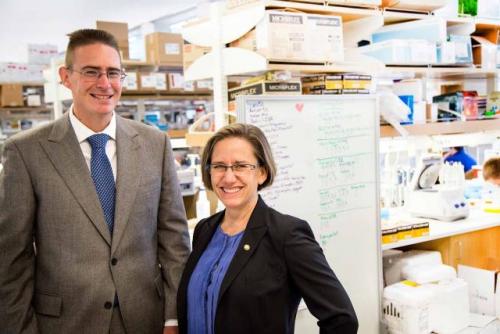
By Heather Buschman
San Diego, Calif., Oct. 29, 2015 — You are only 10 percent human. Ninety percent of the cells that make up our bodies are actually bacteria, viruses, fungi and other microbes. And researchers are now finding that these unique microbial communities — called microbiomes — can greatly influence human and environmental health. The human gut microbiome alone has now been linked to allergies, inflammatory bowel disease, obesity and many other conditions.
 To advance studies of microbiomes found in the gut and everywhere else on earth, Chancellor Pradeep K. Khosla today unveiled the UC San Diego Microbiome and Microbial Sciences Initiative, a concerted research and education effort that will leverage the university’s strengths in science, medicine, engineering and the humanities to produce a detailed understanding of microbiomes and methods for manipulating them for the benefit of human and environmental health.
To advance studies of microbiomes found in the gut and everywhere else on earth, Chancellor Pradeep K. Khosla today unveiled the UC San Diego Microbiome and Microbial Sciences Initiative, a concerted research and education effort that will leverage the university’s strengths in science, medicine, engineering and the humanities to produce a detailed understanding of microbiomes and methods for manipulating them for the benefit of human and environmental health.
“Microbiome research and innovation have grown far beyond the interest or reach of a single laboratory, or even a single discipline,” Khosla said. “UC San Diego is extraordinarily well-positioned to meet the growing need for advanced tools, technologies and expertise to understand and harness the activities of our planet’s and our bodies’ microbial ecosystems. This new Initiative will place our faculty, researchers and students at the forefront of a rapidly emerging and diversifying field that holds great potential for widespread social and economic benefits.”
The UC San Diego initiative comes as two groups of top scientists called this week for a unified effort to advance microbiome research. Their proposals are outlined in two papers, one published by 17 U.S. scientists in the journal Science and another published by three scientists in Nature.
Rob Knight, Ph.D., professor of pediatrics in the UC San Diego School of Medicine and a faculty affiliate of the Department of Computer Science and Engineering (CSE) in the Jacobs School of Engineering, and one of the world’s experts on the microbiome, was part of the U.S. group that co-authored the Science paper.
In the UC San Diego initiative, Knight will lead a new research-focused Center for Microbiome Innovation, as one of the agile engineering centers in the Jacobs School of Engineering, and Kit Pogliano, Ph.D., professor in the Division of Biological Sciences, will direct a new student-centered Microbial Sciences Graduate Research Initiative. Participating faculty and students will also draw from the Division of Physical Sciences, Skaggs School of Pharmacy and Pharmaceutical Sciences, Rady School of Management, Scripps Institution of Oceanography, the hospitals and clinics at UC San Diego Health, and more.
“We are excited about this opportunity to catalyze research across scientific fields and support the advanced training of students and postdocs so we can move microbiome research from a descriptive discipline to an engineering discipline capable of manipulating microbial communities to improve human health and the environment,” Knight said. “We envision a world where better understanding of complex microbial communities and how to harness them for the benefit of humanity makes autism as rare as scurvy, limitations in oil reserves irrelevant, and allows us to make full use of the genetic potential of microbes.”
Under Knight’s leadership, the Center for Microbiome Innovation will coordinate and accelerate many studies like these, led by existing research and bioinformatics groups across the UC San Diego campus. Center staff will support microbial data generation and analysis for center members and others, particularly researchers with interesting samples but without special microbiome expertise.
At the same time, Pogliano will develop the Microbial Sciences Graduate Research Initiative to train the next generation of cross-disciplinary researchers with strong quantitative skills that can be applied to microbiome studies. Students in the initiative will be eligible for seed grants and graduate research fellowships. This support will allow students to work with faculty across the campus to develop new microbiome technologies and apply them to study the microbial communities that play key roles in human health, agriculture and the environment.
“The Microbiome and Microbial Sciences Initiative will provide our students with experience working in interdisciplinary teams, access to cutting edge technologies, and expertise in microbiome research, biomedical engineering, quantitative measurements and modeling, cellular and chemical imaging and drug discovery — skills that are in high demand in both academia and industry,” Pogliano said. “This initiative will leverage our breadth in the quantitative microbial sciences and our collaborative culture to understand, and ultimately control, how these streamlined cells and their dynamic communities impact our health and the environment.”
CSE has an established history of supporting microbiome research, and several of its faculty members will be participating in the Microbiome and Microbial Sciences Initiative in the years to come. CSE Prof. Larry Smarr will be conducting microbiome research in conjunction with Knight’s team; a strong proponent of this growing field, Smarr also recently joined the scientific advisory board of the San Francisco-based microbiome sequencing company uBiome. The department additionally will contribute its strength in bioinformatics, one of its major research emphases.

